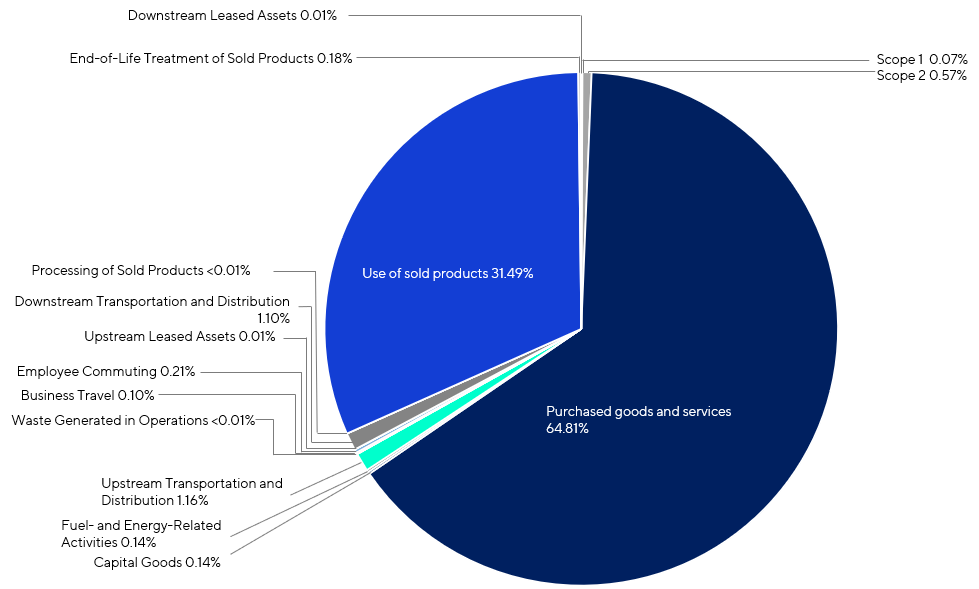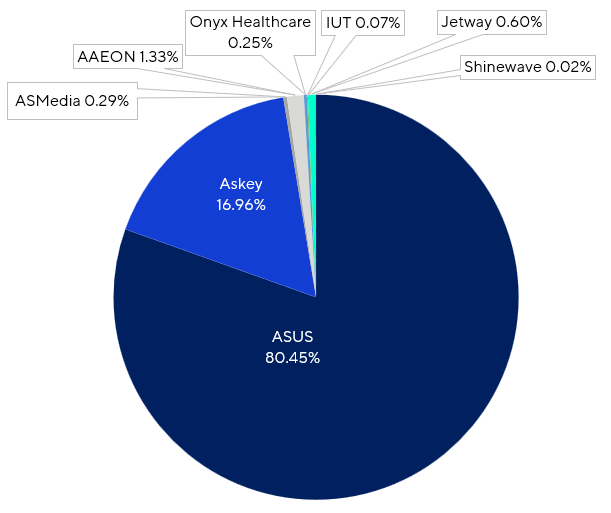The Science Based Targets initiative (SBTi), launched by the United Nations Global Compact (UNGC) and the Carbon Disclosure Project (CDP), provides scientifi c approaches that can be certifi ed by a third party to limit global temperature rise to below 1.5° within the carbon budget. Under this scenario, companies set reasonable carbon reduction targets.
ASUS' Science-Based Targets (SBT)
ASUS, in accordance with the SBTi framework standards, aligned our scope with the consolidated financial statements of the Company. In 2023, ASUS Group, serving as the boundary, achieved validation of SBTi near-term science-based emissions reduction targets. ASUS commits to reducing absolute Scope 1 and 2 GHG emissions by 50% by 2030 from a 2021 base year; in addition, reducing absolute Scope 3 GHG emissions, which cover purchased goods and services and the use of sold products, by 30% within the same time frame.

Two years later, ASUS net-zero target validated by SBTi in 2025 and commits to reduce absolute scope 1 and 2 GHG emissions 90% by 2050 from a 2021 base year and reduce absolute scope 3 GHG emissions 90% within the same timeframe.
Furthermore, ASUS acknowledges that emission reductions within the value chain may be constrained by factors such as the feasibility and commercial viability of carbon reduction technologies. Therefore, achieving net-zero goals necessitates the importance and necessity of engaging in emission reduction actions beyond the value chain. In alignment with the recommendations outlined in the "Beyond Value Chain Mitigation" (BVCM) guidance released by SBTi in February 2024, ASUS plans to participate in carbon reduction projects that adhere to BVCM criteria.
The BVCM (Beyond Value Chain Mitigation) represents recommendations by the Science Based Targets initiative (SBTi) for enterprises, encouraging them to take actions beyond their value chains to reduce greenhouse gas (GHG) emissions.
The BVCM guidance suggests the following steps for enterprises to achieve this:
- Establish BVCM objectives: Enterprises can set targets for reducing emissions beyond their value chains, which should align with the climate goals committed to by the company.
- Identify BVCM opportunities: Collaborate with other companies, non-governmental organizations, and governments to examine and identify opportunities for emission reductions beyond the company's value chain.
- Invest in BVCM projects: Enterprises can invest in BVCM projects to help reduce emissions beyond their value chains. These projects may include renewable energy, afforestation, carbon capture and storage technologies, etc.
- Disclose BVCM performance: Enterprises should apply rigorous measures to ensure that BVCM mitigation or removal outcomes—such as measurement methodology standards, funding deployed, and carbon removal benefits—are reliably achieved and independently verified by a third party.
To ensure investors and stakeholders understand our climate change response actions, ASUS has been publishing Climate-Related Financial Disclosure Reports since 2021, adopting the framework set forth by the Financial Stability Board (FSB) known as the Task Force on Climate-related Financial Disclosures (TCFD). In 2023, the International Sustainability Standards Board (ISSB) released the "IFRS Sustainability Disclosure Standards," providing globally recognized, comparable, and high-quality sustainability reporting. This year, ASUS has taken the lead in adopting the IFRS S2 "Climate-related Disclosures" as the reporting framework for climate-related financial disclosure reports. Outlined in IFRS S2, in addition to governance, strategy, risk management, indicators, and goals related to climate change, we have further disclosed the seven "Cross-Industry Metric Categories".
For detailed information, please visit SBTi Website.
The Carbon Emissions of the ASUS Group
Since 2022, ASUS Group has fully implemented greenhouse gas inventory operations based on the latest consolidated financial statements, covering the scope of its subsidiaries.
In 2024, the complete organizational boundary includes ASUS's global operating locations, "ASKEY", "AAEON" , "ONYX Healthcare" , "JETWAY Information," and “Shinewave," etc. A third-party verification of greenhouse gas emissions was completed, following the framework and calculation principles of the GHG Protocol.
Emissions Data in 2024
| Scope | Carbon Emissions (tonnes CO2e) |
|---|---|
| Scope 1 | 4,047.14 |
| Scope 2 | 32,895.93 |
| Scope 3 | 5,206,474.45 |
| Total Carbon Emissions | 5,243,444.52 |



